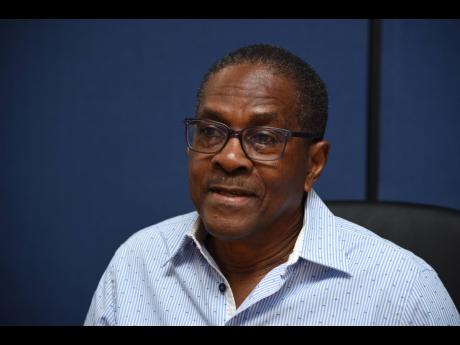Panton spurns calls to speak on IC probes, statutory declarations
The head of one of Jamaica’s chief anti-corruption bodies, Retired Justice Seymour Panton, has rebuked persons who call on the Integrity Commission (IC) to comment on matters relating to statutory declarations or investigations.
Panton reasoned that given the state of the law, “it is irritatingly unfair and unreasonable for persons (some of whom know better) to be requesting that the Commission speak on these matters.
“In my view, Jamaicans are quite low on the ladder of compliance as regards the various laws passed by Parliament. The commission ought not to be, and indeed will not be, in such company,” the IC chairman declared in the commission’s 2023 annual report, which was tabled in Parliament yesterday.
The IC chairman said the anti-corruption body awaits proposed amendments to the Integrity Commission Act that have been submitted to a parliamentary committee reviewing the parent statute.
Notably, Panton made it clear that “there is nothing to prevent declarants or persons under investigation from speaking on the situation as it relates to them”.
Turning to Prime Minister Andrew Holness’ statutory declarations that have not been certified by the IC for the years 2021 and 2022, Panton acknowledged that much has been “written and said” about the matter.
“Given the restrictions imposed by the act as regards statutory declarations generally, and matters related thereto, I may only say that the processes of the commission are nearing completion in respect of the prime minister’s declarations,” Panton said.
TO INFORM COMMISSION
Commenting on the provision that mandates the director of information and complaints to examine the statutory declarations of the prime minister and leader of the opposition, Panton said that where the director is satisfied that it has been duly completed, he is to inform the commission.
The commission then publishes a summary of the declaration in a form that is set out in the Third Schedule of the law. Panton noted that to satisfy himself of the due completion of a statutory declaration, the director of information and complaints “shall make such enquiries as he considers necessary”. The enquiries are aimed at determining accuracy.
In his remarks, IC Executive Director Greg Christie indicated that there are provisions in the IC Act that “some do not like, and it appears that there is a desire to weaken it”. Christie said the commission hopes this does not happen.
He reasoned that the act has vested in the commission, among other things, the responsibility to ensure that those who are privileged to discharge public functions in Jamaica do so in compliance with the highest standards of integrity, good governance and accountability.
“The [IC Act] was not written by the commission. It was written by our lawmakers. We have, therefore, proceeded on the assumption that Parliament was sincere in its expressed intent,” he added.
He argued that sections 53(3) and 56 – the so-called gag clauses – have led to what he described as unwanted outcomes that many did not anticipate.
“The sections, by gagging the commission, have provided a cover for corruption, stifled transparency on a wide range of matters of public interest, fuelled harmful speculation, undermined public trust, and caused grave damage to the integrity of key officials and institutions of the State because of the inability of the commission to provide public clarifications and information on critical issues,” Christie said.
He added that until it is revised, the commission is obliged to enforce the act and steadfastly abide by its terms.

